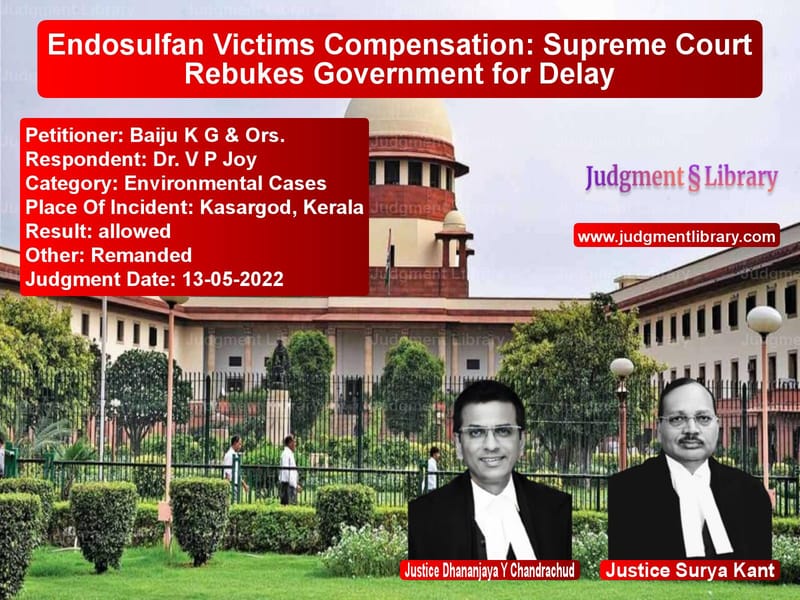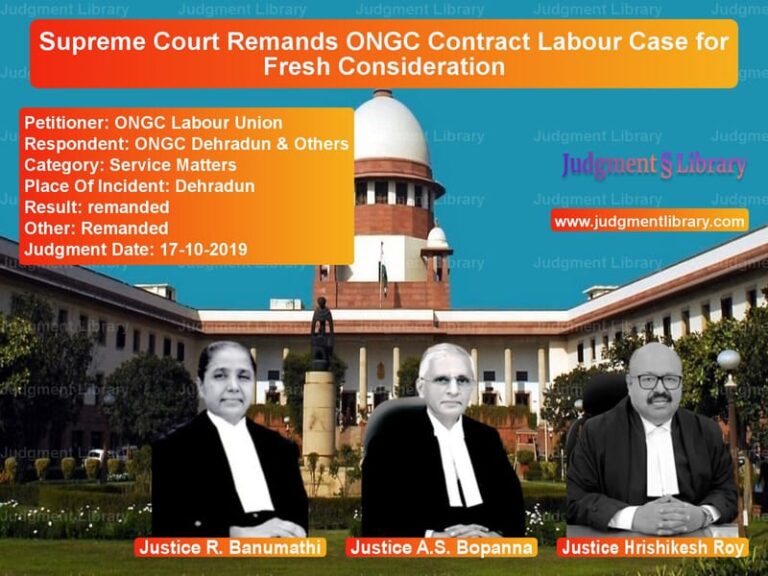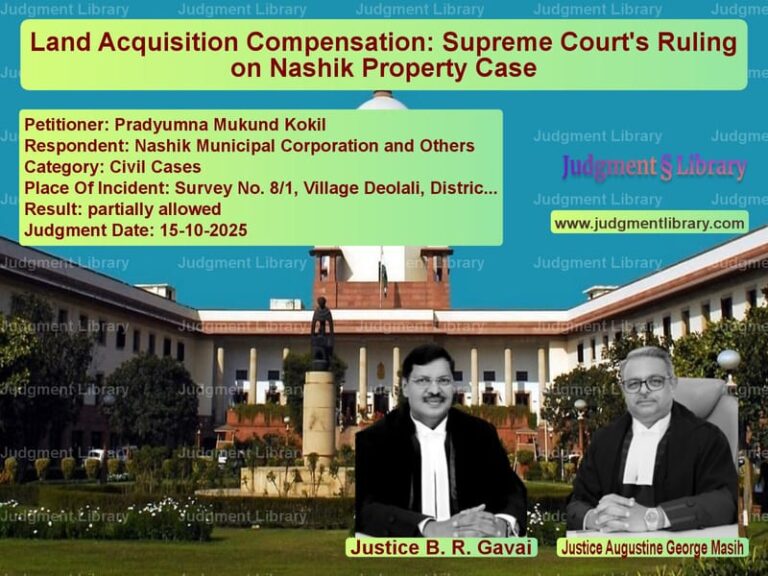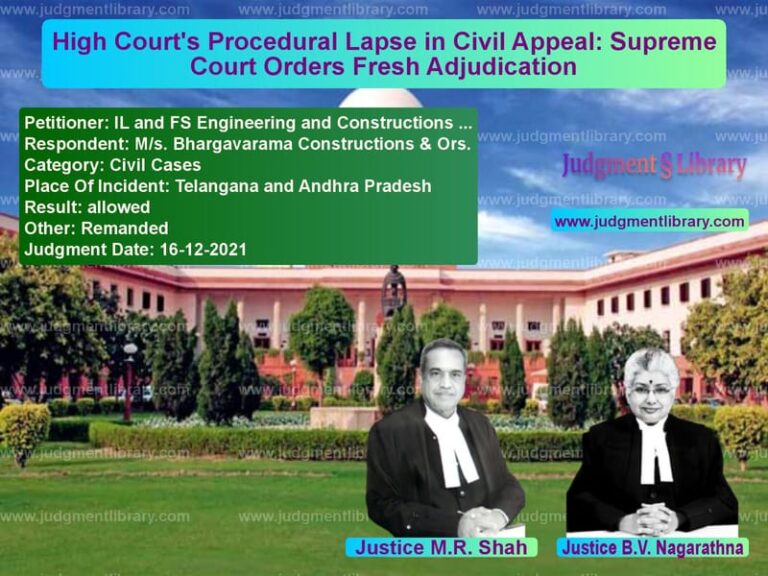Endosulfan Victims Compensation: Supreme Court Rebukes Government for Delay
The Supreme Court of India delivered a significant judgment in the case of Baiju K G & Ors. v. Dr. V P Joy on May 13, 2022, addressing the failure of the Kerala government in compensating victims of the toxic pesticide Endosulfan. The judgment underscores the importance of upholding fundamental rights, particularly the right to health and life under Article 21 of the Constitution.
Background of the Case
The case pertains to the devastating effects of Endosulfan, a pesticide used extensively in Kerala’s Kasargod district, leading to severe health issues among residents. The victims, many of whom suffer from physical and mental disabilities, approached the Supreme Court after the state government failed to implement a 2017 judgment directing compensation and medical care.
In its January 10, 2017 ruling, the Supreme Court had ordered the state governments to compensate all affected persons with a payment of Rs. 5 lakh each within three months. It also directed the governments to consider providing lifelong medical facilities to those suffering from chronic conditions due to Endosulfan exposure. However, despite the passage of five years, the compensation had not been distributed, and victims continued to struggle for medical aid.
Arguments of the Petitioners
The petitioners, who were among the recognized victims of Endosulfan poisoning, contended:
- The Kerala government had failed to comply with the Supreme Court’s 2017 directive.
- Only eight petitioners, who filed the contempt plea, had received compensation, while thousands remained uncompensated.
- Many victims were forced to travel 600 km to Trivandrum for treatment, as no adequate medical facilities were established in Kasargod.
- The delay in compensation was in blatant violation of the fundamental rights of the affected persons.
Government’s Response
The Kerala government, through its compliance report dated May 9, 2022, submitted that:
- A team of officials had been formed to visit 3,704 victims who were yet to receive compensation.
- Of these, 102 were bedridden, 326 had mental disabilities, 201 had physical disabilities, and 119 were cancer patients.
- A government order was issued on January 15, 2022, allocating an additional Rs. 200 crore for compensation.
- As of May 2022, compensation of Rs. 5 lakh had been disbursed to only eight persons.
Supreme Court’s Observations
The Supreme Court strongly criticized the Kerala government for its inaction, stating:
“The Government of Kerala has done virtually nothing for five years. Besides the fact that the delay is appalling, the inaction is in breach of the orders of this court.”
Expressing its displeasure over the selective disbursement of compensation, the Court remarked:
“We fail to understand the logic or the rationale of the State Government in disbursing compensation only to those who have the ability to move this Court.”
The Court emphasized that most of the victims belonged to marginalized communities and were in dire need of financial and medical support.
Legal Principles Cited
The judgment relied on the principles established in Nilabati Behera v. State of Orissa (1993) 2 SCC 746, where the Court held that compensation can be awarded under public law when the state fails to protect fundamental rights. Justice A.S. Anand, in his concurring opinion, had observed:
“The purpose of public law is not only to civilize public power but also to assure the citizen that they live under a legal system which aims to protect their interests and preserve their rights.”
The Court reiterated that compensation under public law is distinct from private claims and is meant to penalize the wrongdoer and uphold constitutional protections.
Directions Issued by the Supreme Court
Taking into account the grave suffering of the victims, the Court issued the following directions:
- The eight petitioners who had received compensation should be given an additional Rs. 50,000 each within three weeks.
- The Chief Secretary of Kerala must convene monthly meetings to ensure compliance with the 2017 judgment, focusing on:
- Identifying all victims eligible for compensation.
- Ensuring full disbursement of Rs. 5 lakh to each victim.
- Setting up proper medical facilities close to their residences.
- A compliance affidavit must be submitted to the Court detailing progress on these directives.
The case was listed for further review on July 18, 2022, to assess the implementation of these orders.
Conclusion
The Supreme Court’s ruling in this case underscores the government’s duty to uphold the fundamental rights of its citizens. By taking a firm stance against bureaucratic delays, the Court reinforced that compensation and medical care for the victims of Endosulfan poisoning are not mere acts of charity but legal obligations.
For the affected families in Kasargod, this judgment represents renewed hope for justice. The directives issued by the Court set a precedent for accountability in cases where state negligence leads to mass suffering. However, the real impact of this ruling will only be determined by the government’s commitment to implementing the Court’s orders.
Petitioner Name: Baiju K G & Ors..Respondent Name: Dr. V P Joy.Judgment By: Justice Dhananjaya Y Chandrachud, Justice Surya Kant.Place Of Incident: Kasargod, Kerala.Judgment Date: 13-05-2022.
Don’t miss out on the full details! Download the complete judgment in PDF format below and gain valuable insights instantly!
Download Judgment: baiju-k-g-&-ors.-vs-dr.-v-p-joy-supreme-court-of-india-judgment-dated-13-05-2022.pdf
Directly Download Judgment: Directly download this Judgment
See all petitions in Public Interest Litigation
See all petitions in Fundamental Rights
See all petitions in Compensation Disputes
See all petitions in Judgment by Dhananjaya Y Chandrachud
See all petitions in Judgment by Surya Kant
See all petitions in allowed
See all petitions in Remanded
See all petitions in supreme court of India judgments May 2022
See all petitions in 2022 judgments
See all posts in Environmental Cases Category
See all allowed petitions in Environmental Cases Category
See all Dismissed petitions in Environmental Cases Category
See all partially allowed petitions in Environmental Cases Category







